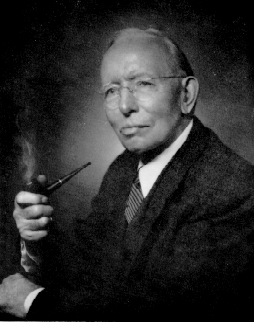| Profile | Major Works | Resources |
Alvin S. Johnson, 1874-1971


Nebraska-born economist, Alvin Saunders Johnson was trained under E.R.A. Seligman and John Bates Clark at Columbia, acquiring his doctorate in 1901. Johnson was, for a while, Clark's personal secretary and heir apparent at Columbia. Although Johnson had been trained as a thorough Neoclassical, he was not opposed to the Institutionalist approach. Nonetheless, Jacob Viner would comment that "For England, Wicksteed, and for the United States, Alvin Johnson (and Fetter?) appear to be the sole surviving upholders of the original Austrian position." (Viner, 1925: p.371).
After teaching at Columbia for a number of years, Johnson moved to the University of Nebraska in 1906, then on to the University of Texas at Austin in 1907, the University of Chicago in 1909, Stanford in 1911 and then Cornell in 1912 (where he was Frank Knight's teacher). After taking leave from academia to work as editor of the New Republic, Johnson took up another appointment at Stanford, only to leave again in 1917 to work on the wartime Council of National Defense in Washington D.C.
In 1918, Alvin S. Johnson helped found the New School for Social Research in New York. He took over as director in 1922 and guided the fledgling institution for the next few decades. In the 1920s, Alvin Johnson worked with E.R.A. Seligman on editing the massive Encyclopaedia of the Social Sciences. In the 1930s and 1940s, as the Fascist and Nazi specter cast its darkness over Europe, Johnson worked overtime to saving numerous Central European scholars from persecution, bringing them to the "University in Exile", an especially-created division of the New School. Johnson retired in 1945.
|
Major works of Alvin S. Johnson
|
| HET |
|
Resources on Alvin S. Johnson |
All rights reserved, Gonšalo L. Fonseca
